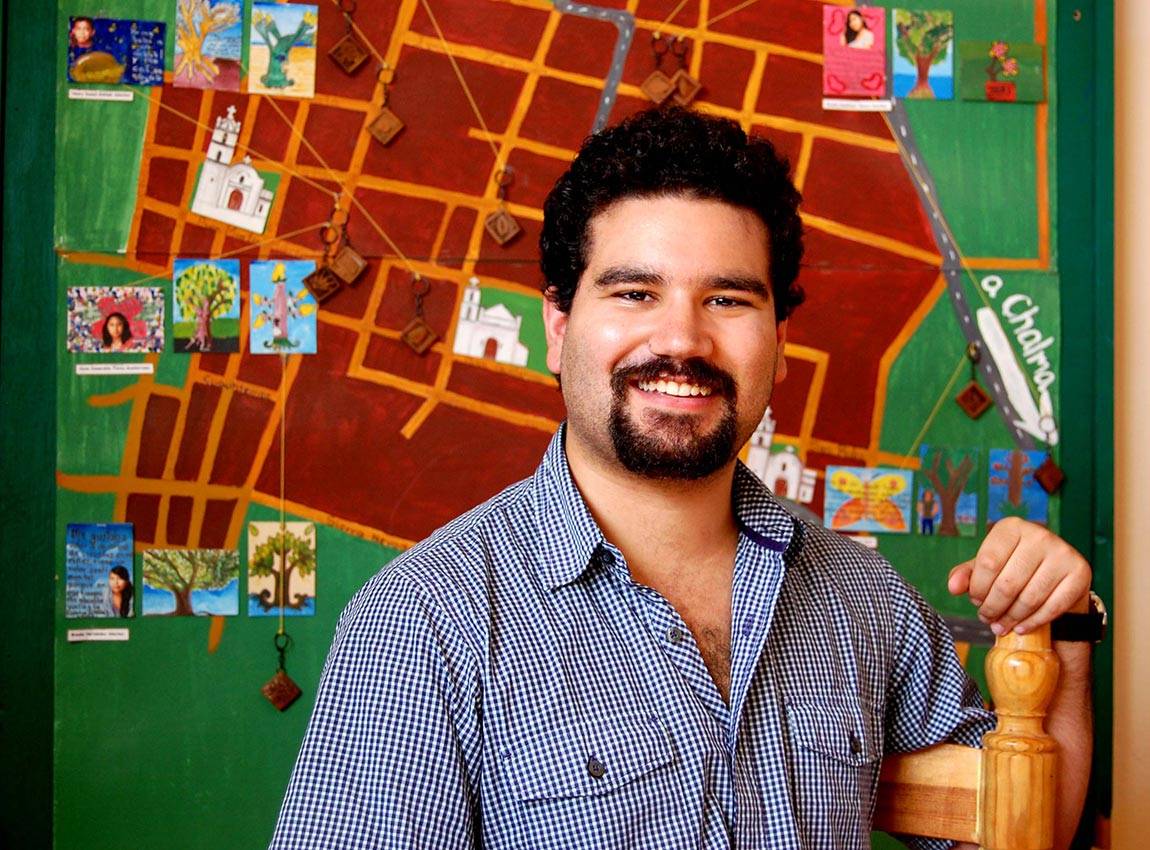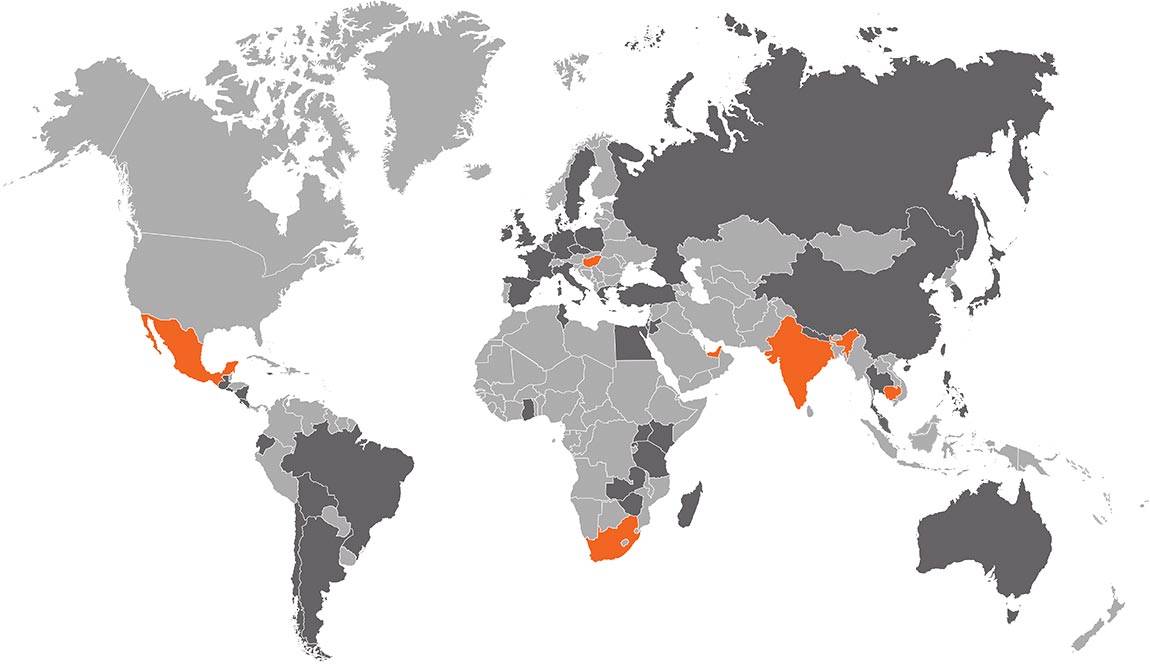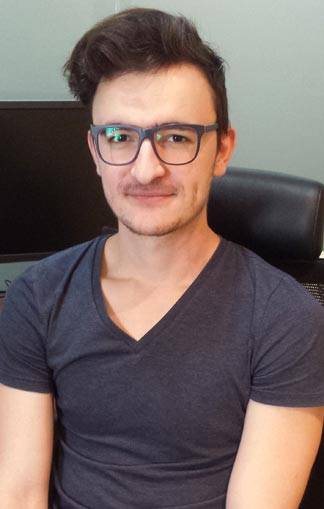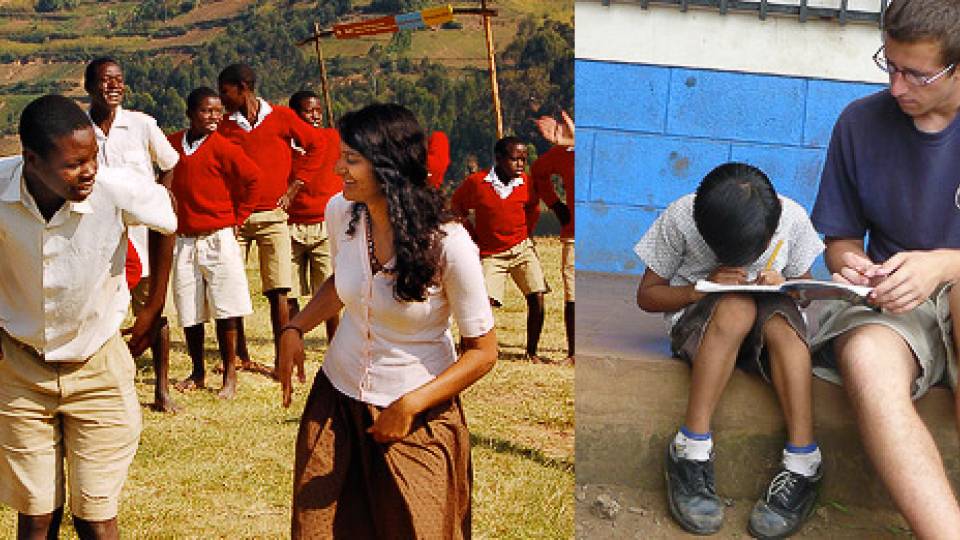This summer, Princeton undergraduate students are gaining new perspectives and opportunities through internships in a variety of fields in more than 50 countries through the University's International Internship Program (IIP).
IIP allows freshmen, sophomores and juniors to live and work abroad during the University's summer break. The program was established in 2000 with just seven student interns. Now, more than 200 participate.
"IIP's placements aim to provide undergraduates the opportunity to fully immerse themselves in a professional setting abroad that will allow them to explore possible career paths and to develop and expand their academic interests," said International Internship Program Director Luisa Duarte-Silva.
She said the program has expanded to offer more internships across all interest areas, including community and public service.
"Most recently, we have developed an increasing number of opportunities for our undergraduates to be 'in the service of all nations' by creating new placements where interns can perform high-impact community development," she said.
Six current interns — Alyson Beveridge, John Michael Colón, Cassandra Crifase, Austin deButts, Theo Dimitrasopoulos and Myesha Jemison — share their experiences below.
"My hope is that each IIP intern returns home with a changed outlook on what their role — whether personal or professional — can be in the larger global community," said Duarte-Silva. "Most of all, I hope that each returning intern has learned to see the world with greater humility and respect for all."

Alyson Beveridge, Class of 2016, says her favorite part about teaching English in Jaipur, India, this summer is singing songs with the youngest children in her class.
Alyson Beveridge
Class year: 2016
Concentration: Geoscience with certificates in theater and musical performance
Internship location: Jaipur, India
Where are you interning and what has been your experience so far?
My IIP internship is teaching English at The Tushita Foundation, a trust in Jaipur. I'm helping teach the children English in non-traditional ways. We use games, music and activities to learn. Personally, I hope to teach the kids lots of music. For the youngest ones it is a particularly strong way to increase their vocabulary.
I'm also hoping to create lessons on conservation and the environment. During my time here, I hope to introduce the kids to new ways of protecting the environment and the mechanisms behind global warming.
Why did you choose this particular internship?
First of all, I absolutely love learning about other cultures and seeing new parts of the world. India has been on the top of my list for places to visit for some time now.
I also love working with kids. In some ways I haven't matured past the age of 5. I like to sing songs, play games and make silly jokes. I was a passionate camp counselor for most of high school and have learned hundreds of camp songs and games. When I'm with children I know I am being my authentic self.
Last but certainly not least, the mission of the foundation really resonated with me. Language is an extremely powerful tool. It allows you to speak with people from different parts of the world. It exposes you to new cultures. It can also totally rewire your brain, changing the way you think about and analyze the world. One of the foundation's aims is promoting women in the community; I'm a firm believer in women's mentorship and the empowerment of women all over the world.
Can you describe a favorite moment of your experience?
My absolute favorite moment was singing songs with the littlest ones at the Tushita Foundation. They had so much pure joy in what they were doing. They couldn't really understand what the words meant, but they followed the actions to all my songs wonderfully and did the best they could to make sounds similar to mine. They were all pretty much brand new to English! I could've kept singing with those kids for hours and hours. At the end of the class they all have to line up by the door and leave one by one as to not overcrowd the small alcove where they keep their shoes. Every single little hand wanted to shake mine and they all wanted to make sure I heard their individual "Good evening, ma'am." It was amazing to feel so special to these children who barely knew me. When my boss told me it was time to leave, I didn't want to say goodbye.

John Michael Colón, Class of 2016, is in Malinalco, Mexico, this summer interning at the nonprofit community organization Instituto del Rincón. He says the group is "dedicated to helping migrants and their families in whatever way we can."
John Michael Colón
Class year: 2016
Concentration: Comparative literature
Internship location: Malinalco, Mexico
Where are you interning and what has been your experience so far?
Every morning I walk a block east to work at the Instituto del Rincón's little office in the rural town of Malinalco. It literally means "the Corner Institute" and it lives up to its name, both in the smallness of the operation and the sense of warmth and familiarity with which the locals regard us — "oh yeah, the institute on the corner!"
Our nonprofit is dedicated to helping migrants and their families in whatever way we can. This entails all sorts of work, much of which helps improve people's lives in a direct and immediate fashion. In my first week we worked closely with the U.S. Embassy to direct a huge initiative to get U.S. passports for the children of migrants who were born in the U.S. and are thus citizens. We were able to get 34 passport requests processed that almost certainly wouldn't have happened without our elaborate efforts. We also help to track down missing migrants for their relatives, help migrants secure key documents such as apostilles and official document translations, provide emergency assistance to migrant families in times of crisis, and promote security and development projects in Malinalco itself.
Why did you choose this particular internship?
I chose this internship because it seemed like a great opportunity to help people I might never meet in an internship in a city or at a law firm. Here, at this nonprofit in a small mountain town, I am working directly with campesinos during an immense humanitarian crisis. As a fluent Spanish-speaker and comparative literature major whose academic work has focused on contemporary Latin America, I felt that El Rincón was the perfect internship for me: they are teaching me valuable lessons.
Can you describe a favorite moment of your experience?
Our passport project was a long and involved process in which we set things up for about a week, helping people get their paperwork in order, before a daylong event at the local cultural center where U.S. Embassy representatives came to process the townfolks' passport requests. During that time I became well acquainted with the case of a particular family, a single mother and her teenage son, who had a troubled history. Because of the way the casework was split up, this was the only family I took through the whole process from beginning to end. I got to know them rather well. The day of the event, I chatted with them while they were in line, practically feeling their excitement as they got processed. Finally, when the son got his passport, it felt like we'd all worked together as a team to make it happen, and the mother was so excited that she gave me a big hug!

Cassandra Crifase, Class of 2017, conducts nanomedicine research at the Semmelweis University Medical School in Budapest, Hungary. In addition to learning in the lab, she says her international internship this summer has provided the opportunity to "soak up the culture of this eclectic and historical city."
Cassandra Crifase
Class year: 2017
Concentration: Chemistry
Internship location: Budapest, Hungary
Where are you interning and what has been your experience so far?
My IIP experience thus far has been extremely rewarding to say the least. This summer has been a combination of exposure to awe-inspiring culture and adventure as well as access to extraordinary opportunities right in my academic field.
During the weekdays, I work on nanomedicine research with the Biophysics Department of Semmelweis University Medical School. I'm able to delve wholeheartedly into work that will hopefully one day improve oncological treatment options. My work is incredibly fulfilling. I work with a pharmacist, Dr. Tamas Bozo, on a project that studies cochleae, a precipitate that could potentially serve as a drug delivery device. When I'm not working with Tamas, I'm able to explore and assist other research projects around the university as well as clinical sectors of the hospital.
I live in a beautiful flat in central Budapest where I'm truly able to soak up the culture of this eclectic and historical city. The community speaks predominantly Hungarian, so it's very cool to begin to learn the language. It is said to be one of the most difficult languages to learn, and I can see why!
Why did you choose this particular internship?
I chose this particular internship because it offers me every aspect I could dream of in one program — the opportunity to experience a new culture and learn a new language, the opportunity to work in a lab setting and with clinicians, the freedom and flexibility to work on several different ongoing projects, and the opportunity to explore a world-renowned medical school and hospital.
Once we arrived, we were able to choose individual projects. I chose to work with cochleae because I have a personal connection to oncology. In 2005, my mom passed away from breast cancer. When she was diagnosed, I thought I just had to find the medicine that would make her better. I, of course, learned it was not that simple. I learned about the chemists, the doctors and the scientists who work every day at discovering a cure, and I began to envision myself as one of them. Her illness jumpstarted my fascination with a medical career, and her passing became the fuel for the journey that I'm still on.
What are some of the takeaways or lessons from your internship?
Some lessons I've learned thus far include: follow the locals; speak as much of the native language as you can manage — even if it's just a word; learn the word for "thank you" in the language of each place you visit; there's no such thing as too careful; the best way to get involved is to ask to be involved; pay close attention when you're the observer so later you can be the actor; ask all your questions — but wait for the right time; and wearing Princeton gear helps you find alumni!

Austin deButts (seated in front), Class of 2016, is spending the summer interning at a social enterprise startup based in Phnom Penh that works to provide sustainable, low-cost solar energy to Cambodians in rural provinces.
Austin deButts
Class year: 2016
Concentration: Woodrow Wilson School of Public and International Affairs
Internship location: Phnom Penh, Cambodia
Where are you interning and what has been your experience so far?
My IIP with NRG Solutions, a social enterprise startup based in Phnom Penh that works to provide sustainable, low-cost solar energy to Cambodians in rural provinces, has been nothing short of an incredible adventure! The diverse group of employees and the startup nature of the company make for a unique working environment — one that provides a behind-the-scenes look at the challenges related to providing renewable energy in a developing country as well as the practical, day-to-day operations of running a business.
Why did you choose this particular internship?
I think I inherited my curiosity for the world from my parents, Boota and Shelley deButts (Class of 1980 graduates), who have always encouraged me to explore new places and cultures. In terms of work, NRG aligns perfectly with my interests in renewable energy; and as a student of the Woodrow Wilson School focusing on climate, energy and the environment, this internship serves the dual purpose of providing a knowledge base and initial research component for my thesis. With a desire to work in renewable energy business/policy in the future, my IIP has the potential to be a great leaping off point for a meaningful career.
What are some of the takeaways or lessons from your internship?
One key business lesson I have learned is the importance of having the right people to work alongside. Because NRG is a small company, the value of each member of the team is magnified greatly; it is truly their personal commitment and dedication that allow the company to be successful.
Another takeaway from living abroad is that although the language barrier can be difficult to overcome at times, I am always amazed at the ability of people to find ways to communicate and convey meaning, even without understanding.
Can you describe a favorite moment of your experience?
My favorite moment so far has been our installation of a We Share Solar Suitcase at Kdey Dong Primary School in the province of Kampong Thom. We spent all day working on the installation in their small library as the curious children huddled around. When we finished, we explained to them (with the help of a translator) how the new solar system worked and how they could use it to read books and hold community meetings in the library at night. To be able to see the wonder on their faces when we flipped the switch for the first time was beyond rewarding and a moment I will not soon forget.

Dimitrasopoulos, a civil and environmental engineering major, has enjoyed learning about the architecture of Dubai while on an international internship in the city this summer.
Theo Dimitrasopoulos
Class year: 2017
Concentration: Civil and environmental engineering
Internship location: Dubai, United Arab Emirates
Where are you interning and what has been your experience so far?
It has now been a little more than a month here and my experience at the IBI Group in Dubai has already been extremely rewarding. I get to attend meetings, learn about architecture and master planning through my supervisor, and, most importantly, have contact with a real client.
On my first day I was given the task of working on a master plan for a planned city in Saudi Arabia, for which I had to create layouts for buildings in CAD and other software. Having very little experience with this kind of technical software, the first few days were a steep learning curve for me. Familiarizing myself with the new environment and learning various tools for the job required a lot of patience (which is an invaluable asset for an aspiring architect like me), but after a lot of keyboard bashing and frustration the task was completed successfully.
My supervisor, my colleagues and I have lunch every afternoon and we discuss many things, from what to do in the Gulf area to Greek politics. I find myself learning a lot from my supervisor about theoretical concepts of cities and the built environment and from the locals about the unique culture of the Middle East and especially the Gulf coast.
Why did you choose this particular internship?
First and foremost, I wanted to gain valuable, real-world experience in my field and see what design and architecture really looks like. Additionally, my curiosity about Middle Eastern culture in combination with my fascination with architecture and design made Dubai the ideal location for my internship.
What are some of the takeaways or lessons from your internship?
So far, I have learned many things in the office about design and urbanism. While Princeton provides a very realistic perspective on the field, engaging with the real thing made me very eager to continue pursuing this path. Outside the office, I learned about the culture, habits and particularly about religious practices, given that my stay in Dubai coincided with this year's Ramadan. It was my first interaction with this fascinating culture, and I will most certainly come back, be it for the business prospects or more cultural immersion.
Can you describe a favorite moment of your experience?
At one point during my internship there was a desk space shortage and I had to move to a rather spacious conference room in the office. I worked there on my assignments and projects silently so as to let the rest of the employees and supervisors hold meetings with other clients and discuss details of current and future developments. However, by listening to them negotiate and analyze details when going over plans and catering to various clients, I learned many tricks of the trade and how to handle different situations, which will prove invaluable when I interact with clients a few years from now.

Myesha Jemison, Class of 2018, says working on rural health care issues in South Africa this summer combines her interests in global medicine and public health.
Myesha Jemison
Class year: 2018
Internship location: Agincourt, South Africa
Where are you interning and what has been your experience so far?
As a student who intends to attend medical school and has strong interests in global medicine and public health, I knew that I wanted to spend my summer engaging in research where these two areas intersected. After months of Google searches and sifting through the IIP website, I came to the conclusion that the MRC/Wits Rural Public Health and Health Transitions Research Unit at the University of the Witwatersrand (Wits Rural) shared my vision of medical research.
Wits Rural engages in research that considers the social aspects of the lives of individual people and populations. Their translational research identifies health-related problems and goes further to implement solutions. One of the projects I am working with now is a longitudinal study that hopes to investigate how adults over the age of 40 in Agincourt, South Africa, are aging by documenting alterations in their health statuses over time. With this research, Wits Rural desires to identify what health disorders and causes of death are prevalent in the area in order to ultimately develop programs to combat such issues.
What are some of the takeaways or lessons from your internship?
In terms of medicine, a quote from Dr. Martin Luther King, Jr. comes to mind: "Of all the forms of inequality, injustice in health care is the most shocking and inhumane."
When comparing rural health care in the hospital where I interviewed patients to urban health care in America, I cannot help but to notice the blatant disparities that exist: insufficient resources, overworked medical professionals and underserved patients. It is truly saddening, yet it inspires me to act — I can already see myself coming back here.
Can you describe a favorite moment of your experience?
One of my most exciting experiences so far was waking up to three giraffes in my yard. Having lived in Virginia Beach for all of my childhood, the most exotic creature I have ever discovered in my yard was a turtle, so to see a giraffe really blew my mind.
On another note, I would have to say my most satisfying experience has been picking up on Tsonga, the local language. It changes the way I am able to interact with patients here who do not speak English. It is one thing to have someone translate conversations between myself and the woman whose blood pressure I'm taking, but being able to talk to her and ask her how she is doing in her own language reinforces a sense of trust.

The University's International Internship Program sponsors internship opportunities in a variety of fields in more than 50 countries. The countries highlighted in orange are where the six students featured in this story are interning this summer: Cambodia, Hungary, India, Mexico, South Africa and the United Arab Emirates. The countries in dark gray are the other places where international internships are offered. (Map illustration by Maggie Westergaard, Office of Communications)


